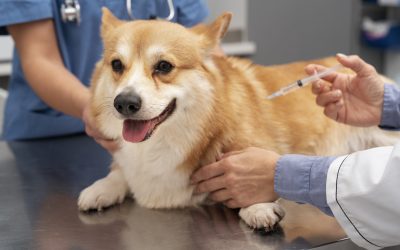Bladder Stones in Dogs [Types, Signs, Treatment, Cost]

Bladder stones, also known as uroliths, are a common health issue that affects dogs of all breeds and sizes. These stones are mineral formations that develop in the urinary bladder, causing discomfort and potential complications for our furry friends. Dog owners must be aware of the signs, treatment options, and associated costs to ensure their pet’s well-being.
Recognizing Signs & Symptoms of Bladder Stones in Canines
Identifying the signs and symptoms of bladder stones in dogs is essential for early detection and prompt treatment. Common symptoms include frequent urination, straining during urination, blood in the urine, and discomfort in the lower abdomen. Some dogs may also display signs of pain, such as whimpering or reluctance to move. It is crucial to consult a veterinarian if these symptoms persist or worsen.
Factors Leading to Bladder Stones in Dogs
Several factors contribute to the formation of bladder stones in dogs. Diet plays a significant role, with certain types of food increasing the risk (foods high in magnesium, phosphorus, calcium, protein, sodium, and acidifying foods). Insufficient water intake can lead to concentrated urine, providing an ideal environment for stone formation. Other contributing factors include urinary tract infections, genetic predisposition, and underlying medical conditions such as Cushing’s disease or hypercalcemia. Additionally, certain breeds such as the Bichon Frise, Miniature Poodle, Maltese, Chihuahua, Lhasa Apso, Pomeranian, Yorkshire Terrier, and Cairn Terrier are more likely to get bladder stones.

Formation Speed of Bladder Stones in Canines
The speed at which bladder stones form in dogs can vary depending on various factors. In some cases, stones can develop relatively quickly, within weeks or months. However, the formation process can also be gradual, taking several years for the stones to reach a size that causes noticeable symptoms. Regular veterinary check-ups and monitoring are crucial in detecting bladder stones early on.
Various Types of Bladder Stones
Bladder stones in dogs can be categorized into different types based on their composition. The most common types include struvite, calcium oxalate, and urate stones. Struvite stones often form due to urinary tract infections, while calcium oxalate stones are more prevalent in certain breeds (Miniature Schnauzers, Bichon Frises, Miniature Poodles, Lhasa Apsos, Yorkshire Terriers, Shih Tzus, Miniature Pinschers) and can be influenced by diet. Urate stones are associated with liver disease and can be more challenging to treat.
Diagnosing Bladder Stones in Canines
Veterinarians employ various diagnostic methods to diagnose bladder stones in dogs. These may include physical examinations, urinalysis, blood tests, and imaging techniques such as X-rays or ultrasound. These diagnostic tools allow veterinarians to determine bladder stones’ size, location, and composition, aiding in developing an effective treatment plan.
Managing and Treating Bladder Stones in Dogs
Managing and treating bladder stones in dogs depends on several factors, including the stones’ size, composition, and location. Small stones may be treated through dietary changes and increased water intake, which can help dissolve or prevent the formation of new stones. In cases where the stones are larger or causing severe symptoms, surgical intervention may be necessary to remove them.
How Much Does Surgery Cost for Dog Bladder Stones?
Factors such as the size and number of stones, the procedure’s complexity, the veterinary clinic’s location, and additional post-operative care can all influence the overall cost. On average, dog bladder stone surgery can range from $1,500 to $3500. It is crucial to consult with a veterinarian to discuss the specific costs associated with your dog’s condition.
The Extra Costs to Consider
When considering dog bladder stone surgery, it is essential to account for additional costs beyond the procedure itself. These costs may include pre-operative bloodwork, imaging tests, medications, and follow-up appointments. Additional treatments or procedures may also be required if complications arise during or after the surgery, incurring further costs. It is important to be financially prepared for these potential expenses.
Recovery and Post-Treatment Care for Canine Bladder Stones
Proper post-treatment care is crucial after bladder stone surgery to ensure a smooth recovery for your dog. This may involve administering medications as prescribed by the veterinarian, monitoring the incision site for signs of infection, and providing a comfortable and stress-free environment for your pet. Follow-up appointments will be necessary to monitor your dog’s progress and make any necessary adjustments to their care plan.
Preventive Measures and Vaccination for Bladder Stones in Dogs
While bladder stones can be challenging to prevent entirely, there are measures dog owners can take to reduce the risk. Ensuring your dog has access to fresh water is vital to maintaining proper hydration and preventing concentrated urine. Feeding a balanced diet appropriate for your dog’s age, breed, and medical history can also significantly prevent bladder stones. Consult with your veterinarian to discuss any additional preventive measures or vaccinations that may suit your dog.
How Can Pet Insurance Help You if Your Dog Has Bladder Stones?
Pet insurance can be a valuable tool in managing the costs of treating dog bladder stones and other veterinary expenses. By having a pet insurance policy in place, you can have peace of mind knowing that you can provide medical care for your furry companion without worrying about the financial burden. Pet insurance can help cover the costs of veterinary consultations, diagnostic tests, medications, and even specialized treatments if required.
Reimbursement
This method is the most common for pet insurance companies. You pay out of pocket for the veterinarian bill, and then the insurance company reimburses you for what’s covered under the insurance plan. The steps look like this.
- You pay the vet bill after your dog’s visit.
- You fill out the pet insurance claim form.
- Submit the claim form and other required documentation to the insurer.
- After the claim is approved, you will be reimbursed for eligible expenses.
What Does Odie Pet Insurance Cover?
Pet insurance covers various veterinary expenses, providing financial protection and peace of mind for pet owners. Here are the details of the coverage options offered by Odie Pet Insurance:
Illness & Injury Plan
The Illness & Injury Plan is an all-inclusive insurance plan designed to cover a wide range of medical needs for your pet. This plan includes comprehensive coverage for various illnesses, injuries, and veterinary services. Some of the covered items include:
- Veterinary exams and consultations
- Diagnostics (e.g., X-rays, lab tests)
- Prescribed medications
- Surgeries and hospitalization
- Rehabilitation, acupuncture, or chiropractic treatments
- Medically necessary supplies
The Wellness Plan
The Wellness Plan is a monthly membership that focuses on preventive care and covers routine veterinary services.
- Provides reimbursements for routine care items such as wellness visits (exams and vaccines), testing and parasite prevention, dental cleanings and at-home dental care, vitamins, supplements, and more
- Through Odie’s partnership with Petivity, a leader in smart pet products and proactive care, Wellness Plan members can also receive reimbursements for Petivity devices and health kits, as well as eligible Purina food and supplements.
- Total reimbursement up to $700 per year.




